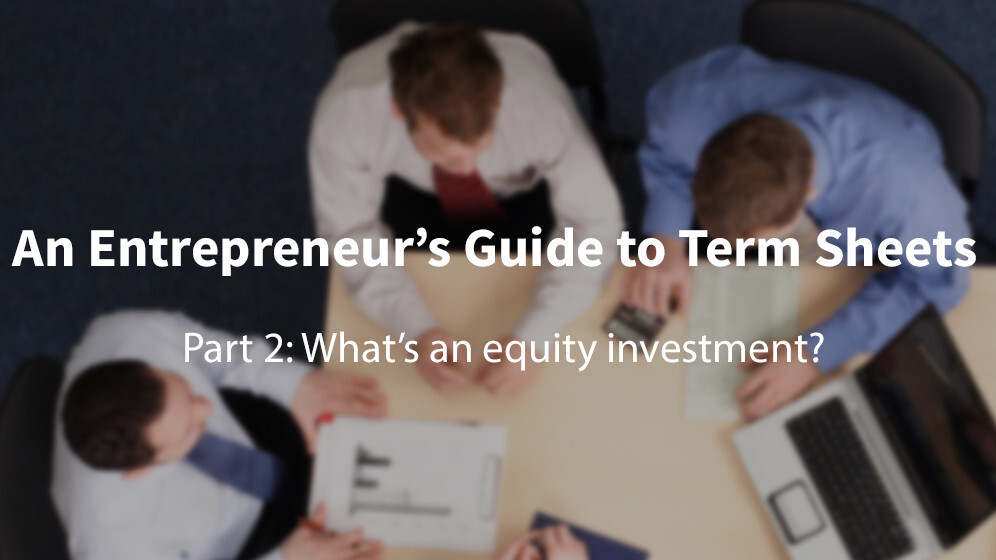
Andrej Kiska is an Associate at Credo Ventures.
In the introductory post to my term sheet guide, we covered a general introduction to term sheets and the trade-off between high valuation and complex investment structure, as well as focused on the basics of a convertible loan.
Now we’ll shed some light on terms in a standard equity round term sheet and provide some context as to how we at Credo Ventures look at each of them.
We’ll try to mimic what we consider a standard set of rights used by US venture capitalists. By using a “Western” structure since the very early days in its lifecycle, a startup can in our opinion improve its likelihood of raising future rounds from Western investors.
The terms
Investment tranches: right after the investment size and valuation (topics I’ve already covered) you will typically find the investment tranches. In order to protect his downside, an investor can split the investment into multiple tranches and include conditions/milestones (customers, revenue, product, etc.) under which each of the tranches will be released.
In the seed and Series A level, we tend not to tranche the investment too much, since it is very hard to set meaningful milestones in such early stages. In seed, we tend to give the whole amount at once or sometimes have it divided into two tranches. Series A is very similar; if it is a larger investment we might include an extra tranche.
Stock options plan: I have already devoted this and this post to employee equity. We typically want to devote between 10-15 percent of company equity in the stock options plan at the seed level.
Timing of creation of the SOP is important: if the term sheet says the plan should be created before the transaction is closed, the equity will go from the stake of original shareholders. If the SOP will be created after the transaction, the investor will get diluted as well.
Board of directors: this one is tricky and pretty important, because some investors (especially the non-standard ones or occasional business “angels”) may use the board to usurp the control of the startup.
Since we try to add value by being hands-on in our companies, we typically nominate one director to the board by Series A at the latest. We have some seed investments with no board of directors or with a board consisting only of management. We have never taken majority in a board at seed or Series A level; i.e. the management should, in our opinion, always keep the majority of the votes (by having more directors than the investors have) at this stage.
Our boards of directors typically meet monthly. Beware of investors that want to take majority or an equal number of seats as management in the board by Series A.
Important caveat for European entities: board of directors is not always a statutory body of the firm supported by legislative framework in a given jurisdiction; the board can be a newly created body backed up by the transaction documentation of the investment.
The board has a list of items that it must approve (e.g. expenses greater than XX EUR, hiring of key people, sale of shares in the company, etc.), some unanimously, some by majority of the vote. The item list is also part of the term sheet.
Lock-up rights: they limit founders’ ability to sell their shares without consent of the investor. The investor invests in the people — why would he want to be part of a company in which the founders can sell their shares and leave at any moment?
Tag-along/co-sale right: based on a similar logic as the lock-up rights, tag-along clause describes the right of an investor to tag along in a sale of the firm if the founders choose to sell a larger portion of their shares.
Example: if the founders decide to sell 10 percent of their stake to a third-party, investor will have a right to sell his entire stake under the same terms as the founders. If the buyer does not want to buy investor’s stake, he can’t buy the founders’ stake either.
Right of first refusal: another right in the same class as the lock-up and tag-along rights. Right of first refusal states that before any shareholder sells his stake to a third party, he must offer his stake to existing shareholders at the same terms. The selling shareholder can only sell the stake if remaining shareholders don’t want to buy it the stake.
Pre-emption/pro rata rights: this clause essentially reserves the right to participate in the future financing rounds.
Typically this includes a pro-rata right: let’s say that an investor owns a 20 percent stake in a startup, which is about to receive additional EUR 5,000,000 investment. A pro-rata right allows the investor to invest EUR 5,000,000 * 20 percent = EUR 1,000,000 at the same terms as the rest of the investors.
In our seed investments, we sometimes include more than a pro-rata right to make sure that we can deploy more capital into really promising companies.
Anti-dilution: this one can also get quite tricky, and some investors use it to limit their downside risk. The anti-dilution clause describes how each shareholder gets diluted in a “down round”: a future investment round with a lower valuation than the current investment round.
There are two basic concepts: full ratchet and weighted average anti-dilution. While full ratchet essentially means that only the founders will get diluted (i.e. investors don’t get diluted at all), weighted average approach assumes dilutions of both investors and founders.
If you want a deep dive on the technicalities of the anti-dilution clauses, check out this post by Brad Feld. I personally consider it rather entrepreneur-unfriendly.
No lawyers
Just one closing remark: I strongly recommend resisting the urge to invite a lawyer to review the term sheet, especially if it is not a Silicon Valley lawyer who has executed hundreds of similar transactions
Most of the local lawyers don’t understand startup investing but want to have as much input as possible so they can clock in (and bill) more hours. Things can get very counter productive very quickly; unfortunately, we had to walk away from a couple of transactions where the startup invited their friend-lawyer to review the term sheet, which resulted in a total mess.
If you want advice on a term sheet, read blogs of other VCs, or get help from respected startup mentors, which any accelerator or angel can recommend. Just please avoid inexperienced lawyers who are more interested in billing their hours than helping the startup succeed.
Read next: A first-time founder’s guide to term sheets: What’s a convertible loan?
Get the TNW newsletter
Get the most important tech news in your inbox each week.







